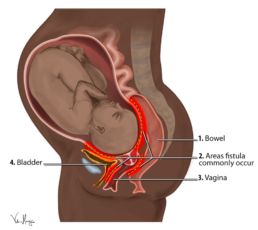Fistula is the most heartbreaking condition you’ve never heard of.
An obstetric fistula is a birth injury to a mother caused by a prolonged, obstructed labor. It most commonly occurs among women who live in developing countries, who give birth without adequate access to Caesarean section.
A fistula is a passage or hole between two organs in the body.
An obstetric fistula is a passage between a woman’s vagina and her bladder and/or rectum. This abnormal communication develops at the end of pregnancy when labor is obstructed and lasts many hours or days. The pressure of the baby’s head against the mother’s pelvis cuts off blood supply to the surrounding tissues in the birth canal.

Two million women suffer from fistula worldwide.
The World Health Organization (WHO) estimates that in Uganda alone there are over 200,000 women enduring life with fistula. For every woman that gets treatment over 50 women go without.
Lack of timely medical intervention, including extremely limited access to emergency Caesarean sections, forces women to endure life-threatening labor.
The consequences of the hours or days of obstructed labor are tragic:
- the baby often dies in utero from prolonged lack of oxygen
- the mother is left with severe physical injuries: obstetric fistula, causing uncontrollable, chronic incontinence that leads to extreme social stigmatization.
- These women are often abandoned by husbands and outcast from society and work.
- They suffer kidney disorders, skin infections, severe depression, neurological problems like foot drop and even death if left untreated
Obstetric fistulas are entirely preventable and correctable.
Obstetric fistula occurs most often among impoverished girls and women, especially those living in regions without adequate medical services. Affecting the most powerless members of society, obstetric fistula touches issues related to reproductive health and rights, gender equality, poverty and adolescent reproductive health.

